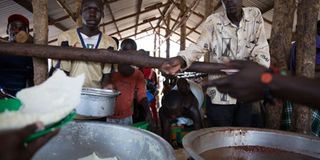Government to borrow Shs560b for refugee host districts

Welfare. Refugees line up to receive food rations at Palorinya Refugee Settlement in Moyo District on June 4 last year.
What you need to know:
- The Department of Refugees in the Office of the Prime Minister and UNHCR estimate that Uganda was hosting more than 1.3 million refugees and asylum seekers, at the end August 2017.
Kampala. Government borrowing is set to hit $200m (Shs749b) if Parliament approves the request to borrow an additional $150m (Shs560b) for infrastructure development in refugee hosting districts.
Officials from the Office of the Prime Minister yesterday said Parliament had earlier approved a request to borrow $50m (Shs187b) for the construction of classrooms, health facilities and road infrastructure before government later requested the additional $150m.
While meeting members of the East African Legislative Assembly (Eala) committee of foreign affairs and conflict resolution, Dr Robert Limlim, the programme manager of Development Response to Displacement Impact Project at the OPM, said several projects were already being rolled out in the host communities.
“We have commenced financing of 83 separate infrastructure projects in 11 districts and the coverage includes the districts of north, and other parts of the country,” Dr Limlim said.
Some of the host districts include Yumbe, Arua, Isingiro, Kamwenge, Lamwo and Kiryandongo.
Mr Joel Wanjala, the acting Permanent Secretary at OPM, said there was already a huge burden on the existing infrastructure of the hosting communities.
“A health centre that was supposed to serve 500 host communities now has 2,000. A classroom that was supposed to accommodate 50 pupils, now suddenly gets more than 100 and in some instances, more than 200, so what do you do with such huge numbers?” Mr Wanjala asked.
In the West Nile districts of Moyo and Adjumani, the South Sudan refugees are said to outnumber the citizens.
Health planners in Arua, Busia, Koboko and other frontier towns perennially report faster stock-out of medicines, including anti-retroviral drugs, because they cannot turn away neighbours, who are not budgeted for, when they show up for treatment.
Mr Wanjala said government has now created a programme that only targets refugee hosting districts.
However, Ms Mary Mugenyi, an Eala member, questioned the rationale for shifting the burden of hosting refugees on Ugandan taxpayers.
Ms Mugenyi said while the country’s refugee policy sets pace for the world, the generosity must not be overstretched.
“These huge loans will have to be paid back and it is Ugandans who will shoulder the burden. Refugee crisis is a world issue and the international community must be able to fund their issues in Uganda,” Ms Mugyenyi said.
She also said host communities either have no land or it is limited, adding that in West Nile, government has no land gazetted for hosting refugees.
“We need to have a clear picture of how this land is being acquired. Is it community land? Is it individuals offering their land? What are the terms and how do they benefit?” Ms Mugyenyi asked.
Government is yet to respond on the criteria.
In May, the Speaker of Parliament, Ms Rebecca Kadaga, requested the UN for additional financial support to accommodate the growing number of refugees.
The Eala members are expected to meet political leaders, including the Prime Minister, the Minister for Disaster Preparedness and MPs today.
Refugee numbers
The Department of Refugees in the Office of the Prime Minister and UNHCR estimate that Uganda was hosting more than 1.3 million refugees and asylum seekers, at the end August 2017. Slightly over one million are from South Sudan while others are from the DR Congo, Burundi, Somalia and other countries. In 2017, the Unicef humanitarian report projected that the total refugee population in Uganda would increase from 1.4 million to about 1.8 million by December 2018.
According to a study by the Economic Policy Research Centre, people living in Uganda’s refugee hosting districts – both people from host communities and refugees – are deprived of basic services such as water, sanitation and shelter.




